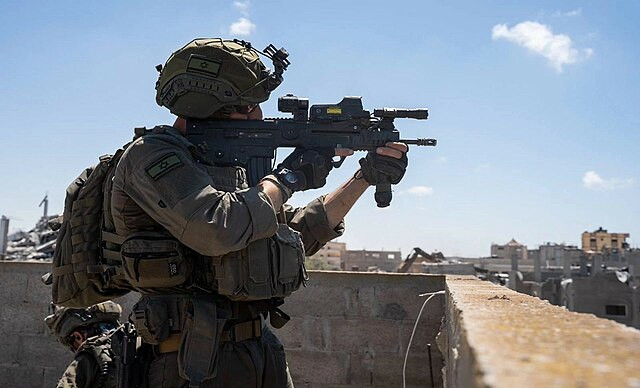An Israeli airstrike on a tent camp in the Gazan city of Rafah has resulted in the deaths of at least 45 people, prompting an international outcry. The strike, which ignited a devastating fire, has intensified global calls for Israel to cease its offensive actions in Gaza. The attack occurred late Sunday night, with flames rapidly engulfing tents and rickety metal shelters, leaving many families scrambling for safety.
According to Palestinian health officials in Gaza, the majority of the victims were women, children, and the elderly. Survivors described a scene of chaos and terror. "We were praying and getting our children's beds ready to sleep. Then we heard a very loud noise, and fire erupted around us," recounted Umm Mohamed Al-Attar, a resident of the camp. Her harrowing account highlights the sudden and devastating impact of the strike.
The Israeli military has acknowledged the strike but stated it was intended to target senior Hamas commanders in the area. "Based on precise intelligence, the operation was aimed at eliminating key figures responsible for orchestrating attacks on Israel," a military spokesperson said. Despite these assertions, the incident is under investigation by the Israeli military's Joint Chiefs of Staff to determine how civilian casualties occurred.
The international community has reacted with strong condemnation. French President Emmanuel Macron expressed his outrage, stating, "These operations must stop. There are no safe areas in Rafah for Palestinian civilians." Similarly, German Foreign Minister Annalena Baerbock emphasized the need for adherence to international humanitarian law, including in conflict zones.
The Rafah incident has drawn renewed attention to the ongoing conflict in Gaza, where more than 36,000 Palestinians have been killed since the Israeli offensive began. This military campaign was launched in response to a deadly attack by Hamas militants on southern Israeli communities on October 7, which resulted in approximately 1,200 Israeli deaths and over 250 hostages taken, according to Israeli authorities.
In Rafah, the aftermath of the strike left a scene of utter devastation. Video footage obtained by Reuters shows a raging fire, with residents frantically attempting to rescue those trapped under debris. Abed Mohammed Al-Attar, who lost several family members in the blaze, voiced his anger and grief. "The army is a liar. There is no security in Gaza," he said, sitting beside the shrouded bodies of his relatives.
The Palestinian Ministry of Foreign Affairs condemned the strike as a "heinous massacre," while Egypt criticized the "deliberate bombing of displaced persons' tents," labeling it a blatant violation of international law. Adding to the tension, reports emerged of an exchange of fire between Israeli and Egyptian soldiers near the Rafah border, resulting in one fatality.
The humanitarian impact of the ongoing conflict is severe, with aid groups warning of catastrophic conditions for civilians in Gaza. The United Nations has called for an immediate halt to hostilities, reiterating the need for the safe and unconditional release of hostages held by Hamas. Meanwhile, Israeli Prime Minister Benjamin Netanyahu faces mounting scrutiny over the conduct of the war, which has now persisted for over seven months.
Amid the rising death toll and global condemnation, the path to peace appears fraught with challenges. Qatar, a key mediator in ceasefire negotiations, warned that continued Israeli strikes could jeopardize efforts to reach a truce. The international community remains divided, with calls for both restraint and decisive action to protect civilian lives.




